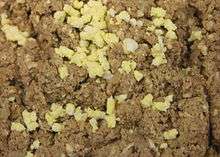Chopped liver
Chopped liver (Yiddish: געהאַקטע לעבער, gehakte leber) is a liver pâté popular in Ashkenazic cuisine. This dish is a common menu item in kosher Jewish delicatessens in Britain, Canada, South Africa, and the United States.
 Chopped liver with egg | |
| Alternative names | Gehakte leber |
|---|---|
| Course | Hors d'oeuvre |
| Associated national cuisine | Ashkenazi Jewish |
| Main ingredients | Liver, onions, schmaltz |
Preparation and serving
The dish is often made by sautéing or broiling liver and onions, adding hard-boiled eggs, salt and pepper, and grinding that mixture. The liver used is generally calf, beef, or chicken.
The quintessential fat used is schmaltz, but different methods and materials exist, and the exact process and ingredients may vary from chef to chef.[1]
Chopped liver is often served on matzah, or with rye bread as sandwiches.
 Chopped liver
Chopped liver A chopped liver meal
A chopped liver meal
Variations and alternatives
Chopped liver is high in protein but also high in fat and cholesterol. There are low-fat, mock and vegetarian alternatives, often made of a combination of peas, string beans, eggplant, or mushrooms.[2]
Chopped liver as an expression
Since eating chopped liver may not be appreciated by everyone, the Jewish English expression "What am I, chopped liver?", signifies frustration or anger at being ignored on a social level.
An explanation of the expression is that chopped liver was traditionally served as a side dish rather than a main course. The phrase therefore may have originally expressed a feeling of being overlooked, as a "side dish".[3]
The origin of the expression is difficult to trace, with many spoken references in older television, comedy and cinema not written down. It is used in the 1949 book The Curtain Never Falls[4] by comedian Joey Adams.
Similar dishes
References
- "Great Chopped Liver". Canadian Jewish News. Retrieved 25 January 2020.
- Vegetarian Chopped Liver (Pareve) http://kosherfood.about.com/od/vegetarianmaindishes/r/vegie_chopliver.htm
- Ask the Rabbi: What Am I, Chopped Liver? at Ohr Somayach
- Joey Adams (1949). The Curtain Never Falls. F. Fell. p. 175.
| Look up chopped liver in Wiktionary, the free dictionary. |